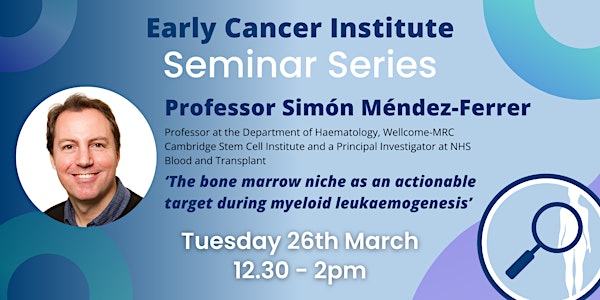The seminar series from the Early Cancer Institute aims to connect researchers in the early cancer detection and diagnosis space to share knowledge and spark collaboration. Join fellow researchers for lunch and an opportunity to network.
On Tuesday 26th March we welcome Simón Méndez-Ferrer, Professor at the Department of Haematology, Wellcome-MRC Cambridge Stem Cell Institute, and a Principal Investigator at NHS Blood and Transplant, to give a talk: 'The bone marrow niche as an actionable target during myeloid leukaemogenesis'
This event will take place in the Early Cancer Institute, Adrian Way, Cambridge Biomedical Campus, Cambridge, CB2 0XZ
Lunch is provided from 12:30pm, the talk will begin at 1.00pm followed by a Q&A. Please ensure you arrive promptly.
Speaker Biography:
Simón Méndez-Ferrer is a Professor at the Department of Haematology, Wellcome-MRC Cambridge Stem Cell Institute, University of Cambridge, and a Principal Investigator at NHS Blood and Transplant.
His research focuses on the extrinsic regulation of haematopoietic stem cells (HSCs) and its implications for the early detection and treatment of haematological malignancies. His multidisciplinary training in neuroscience, physiology, stem cells and cancer has allowed him to make original contributions in the interphase fields of (cancer) stem cell niche, neuroimmunology and inter-organ communication. For instance, work from his team discovered a connection between the bone marrow, the brain and other systemic signals, which regulate the behaviour of blood stem cells and immune cells. He found that that the brain regulates a peripheral stem cell niche in the bone marrow, where mesenchymal stem cells (MSCs) play a key role in the HSC niche, leukaemogenesis and therapy resistance.
Ageing is associated with an increased risk to develop myeloid malignancies, such as myeloproliferative neoplasms (MPNs) and acute myeloid leukaemia (AML). His team showed that remodelling of bone marrow niches promotes myeloid cell expansion during premature or physiological ageing and that niche heterogeneity and ageing influences the pathogenesis and therapy response in MPN, such that damage to the HSC niche is required for MPN development. This translational research led to two Phase-II multicentre clinical studies testing the redeployment of sympathicomimetic drugs and selective oestrogen receptor modulators targeting the extrinsic HSC regulation in MPN.
His work has been supported by ASH Scholar Award, Joanne Levy Memorial Award, Howard Hughes Medical Institute, ERC Consolidator grant, MRC and CRUK Programme Foundation Award.
